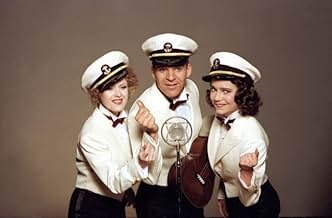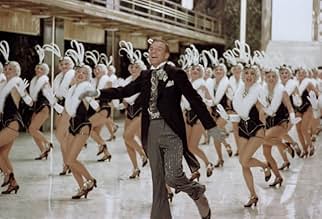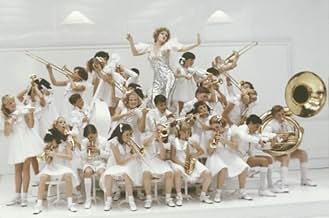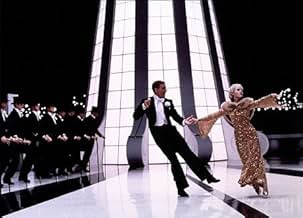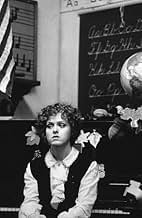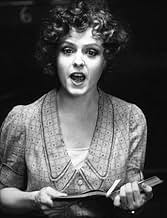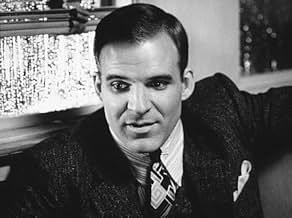Durante la Grande Depressione, un venditore di spartiti musicali cerca di scappare dalla sua ordinaria vita attraverso la musica popolare e una relazione d'amore con un'insegnante innocente.Durante la Grande Depressione, un venditore di spartiti musicali cerca di scappare dalla sua ordinaria vita attraverso la musica popolare e una relazione d'amore con un'insegnante innocente.Durante la Grande Depressione, un venditore di spartiti musicali cerca di scappare dalla sua ordinaria vita attraverso la musica popolare e una relazione d'amore con un'insegnante innocente.
- Candidato a 3 Oscar
- 3 vittorie e 9 candidature totali
- The Bartender
- (as Frank McCarthy)
- Tart
- (as Shirley Kirkes)
Recensioni in evidenza
This leaves the film's cast with a difficult task, as they must not only contend with their dramatic art, but also be well versed in a variety of demanding dances and highly disciplined choreography. Comedian Steve Martin is far from the first choice to portray the downtrodden protagonist in any film, but the actor acquits himself expertly in both the film's demanding dance and drama. Mousy Jessica Harper delves into her eternally repressed character so deeply that one is never certain where one stops and the other begins; a triumph of form for any thespian. Renowned dancer Vernel Bagneris is mesmerizing as the film's most ambiguous character, and his density-defying dance to Arthur Tracy's heartbreaking rendition of the title song is one of my favorite moments in any film.
Even more impressive is tough guy actor Christopher Walken's then-unexpected prowess on the dance floor, as he delivers a riotously funny and surprisingly sexy striptease to Irving Aaronson's "Let's Misbehave." In this sequence, Walken pulls off the difficult hat trick of satisfying both seasoned viewers and film neophytes, while still managing to leave both groups wanting more. Best of all, however, is the lovely Bernadette Peters in a superb, Golden Globe award-winning performance. Never before has Peters' slightly tarnished Kewpie-doll personae been better utilized, and the actress' transformation from repressed schoolmarm to hardened prostitute feels both stunningly and horrifyingly real.
Herbert Ross and his creative team manage to bind all of the pieces together into one seamless collage of lost hope, forced optimism, and never-ending desperation. Gordon Willis' cinematography is never less than completely awe-inspiring, and the combined efforts of top-drawer art and set direction and Bob Mackie's seemingly authentic period costumes helps cement the look and feel of desolate decade that the film represents. Over all films in every genre, PENNIES FROM HEAVEN would be a likely contender to receive my vote for the single most underrated film masterpiece of the last twenty years. It exudes all of the contradictory joy and heartbreak that the movies offer, and serves it all up in one stunning presentation.
The film is innovative and definitely not your father's musical, and the songs, done up not in 1981 over-orchestration but in that tinny sound of early vinyl, just blow me away. After I saw it, I went searching for Follow the Fleet just to see 'Face the Music' in reel time.
This film will not be everyone's cup of tea. It is one of those movies that I say works best when you begin with "Once upon a time."
The music is good. The musical numbers are creatively shot and well-executed; the Walken number alone took weeks to film. The sets, costumes, photography, and color are beautiful and give the film a real Depression feel. Clearly, no expense was spared. The actors give it their all. The re-creations of photos and paintings (including "Nighthawks" which is actually from WW2) are breathtaking. They must have been very hard to set up, light, and shoot. But, in keeping with the film's low-key style, they're not lingered on at all, and if you look away you can miss them.
Is the problem Steve Martin? This choice caused some controversy in 1981. He lacked film experience and he might not have been the ideal choice, although it's hard to guess what other leading man could have done that vaudeville stuff in 1981. Martin, at least, doesn't obviously fall down on the job; the verdict is still out. But Peters, who even apart from this film seems to belong to the '30s, holds up her end of things.
Maybe it's the script and the way the film is conceived. If the idea is to realize what these '30s drudges fantasize about-- and to do it in a '30s-musical style, as if they imagine themselves the heroes of musicals-- then there has to be something to the drudges that makes us care what they fantasize about. But there isn't enough to these people. They're drawn as thin types; yet the material is played very slowly, as if they were supposed to turn into real people at some point. They never do, and so by the end it all peters out (no pun intended). I also thought the subplot with the young girl was a maudlin absurdity, right out of a Mary Pickford tear-jerker.
Perhaps the real problem can be traced back to the origins of the project. It plays almost like an English musical made in an American style, and it doesn't work very well. The humor in the book is too tedious, too black, and too obsessed with tit jokes to be American. And the musical numbers are too slick, loud, and overproduced to be English. The filmmakers couldn't find a way to make these two parts fit together. And so they are just jammed together over and over again. One is constantly aware of the bad fit. It just doesn't come together, but in the various parts there are still more than enough reasons to see it.
Lo sapevi?
- QuizChristopher Walken's bar-top dance scene took two months of rehearsal and two days of shooting. He claims he got compliments later from fans Fred Astaire and Gene Kelly.
- BlooperIn the classroom, a modern Canadian flag can be seen. It wasn't designed until 1964.
- Citazioni
Joan Parker: [referring to Arthur's male organ, after discovering he's having an affair] Cut his thing off.
[the detective shows a look of shock and disgust]
Joan Parker: I want them to cut his thing off and bury it!
- Colonne sonorePennies from Heaven
(1936)
Written by Johnny Burke and Arthur Johnston
Published by Intersong Music
Performed by Arthur Tracy
Courtesy of Decca Co. Ltd
Later sung by Steve Martin (uncredited)
I più visti
- How long is Pennies from Heaven?Powered by Alexa
Dettagli
- Data di uscita
- Paese di origine
- Lingua
- Celebre anche come
- Pennies from Heaven
- Luoghi delle riprese
- 4th Street Bridge, Los Angeles, California, Stati Uniti(murder scene, S Santa Fe Ave. Overpass)
- Aziende produttrici
- Vedi altri crediti dell’azienda su IMDbPro
Botteghino
- Budget
- 22.000.000 USD (previsto)
- Lordo Stati Uniti e Canada
- 9.171.289 USD
- Lordo in tutto il mondo
- 9.171.289 USD
- Tempo di esecuzione
- 1h 48min(108 min)
- Mix di suoni
- Proporzioni
- 1.85 : 1



